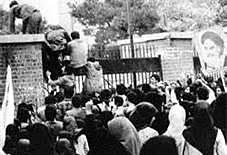In the late 1970’s, Iranian students, inspired by Islamic leaders, seized the United States embassy in Tehran.
 Thumbing their noses at international law, they held U.S. diplomats hostage for 444 days. Religion entered as a major actor on the world stage. Over three decades later, the murder of American diplomats in Benghazi, Libya, by religious terrorists indicates that the religious script is still in play.
Thumbing their noses at international law, they held U.S. diplomats hostage for 444 days. Religion entered as a major actor on the world stage. Over three decades later, the murder of American diplomats in Benghazi, Libya, by religious terrorists indicates that the religious script is still in play.
What happened? Though at the time of the Iranian revolution, the Soviet Union would not tumble for a few more years, the Cold War was thawing. The United States and the Soviet Union signed agreements limiting nuclear weapons. Egypt and Israel endorsed the Camp David accords. Optimists saw glimpses of an upward march to worldwide peace, individual freedom, and economic advancement.
Not all were buying in. The money from Iran’s oil industry allowed Western-style consumerism that seemed empty to many Iranians.
 The student revolt was nationalistic, an attempt to root out foreign influence and government brutality, but it included yearnings for a less secular culture. Now recent revolts in Tunisia and Egypt have dethroned secular governments and elected Islamists.
The student revolt was nationalistic, an attempt to root out foreign influence and government brutality, but it included yearnings for a less secular culture. Now recent revolts in Tunisia and Egypt have dethroned secular governments and elected Islamists.
How can the United States, which prizes freedom of religion for all its citizens, deal with states whose laws favor one specific religion?
In recognition of the need for more understanding, the U.S. State Department created the position of an Ambassador for International Religious Freedom in 1998. Its mission is to promote religious freedom as a core objective of U.S. foreign policy. The report for religious freedom in 2011 is now public.

